Their ways and quiet strength can teach more than any textbook
Ageing is a quiet unfolding – a slow and dignified process that brings with it not only physical change but a deepening of wisdom, memory and presence. As I reflect on the role of elders in our society, I cannot help but think of my mother – not just as an elder, but as the heart of my world, the constant in my life’s rhythm.
In traditional cultures, elders are celebrated as the carriers of wisdom, as storytellers and guardians of values. Growing up, I didn’t need to look to books or formal institutions to understand life’s deeper meanings – I had my mother. Her stories, her ways, her quiet strength taught me more than any textbook could. She is the embodiment of resilience, having weathered hardships with grace and a quiet dignity.
The wisdom I live with
My mother never gave long lectures or sought attention. Her wisdom came through small, everyday moments – how she folded clothes with care, how she lit a candle for someone in need, how she remembered everyone’s birthdays, even those who had forgotten hers. These weren’t grand gestures, but to me, they were everything. Through her, I learned patience, empathy and the kind of love that asks for nothing in return.
This is the kind of wisdom that society is at risk of losing.
A disconnect we cannot afford
Today, many elders live on the margins of family life, their voices muted by a society that values speed, youth and convenience. I see it around me – families stretched thin, ageing parents living alone, their days filled with quiet and waiting. The rise of professional care may solve logistical problems, but it often strips elders of the one thing they truly need: connection.
I am grateful I still have my mother close. Caring for her is not a burden – it is a gift. It is time I get to spend with her, learning anew what I thought I already knew. Her presence anchors me. And I know that in those moments when I sit beside her, hold her hand or laugh with her over something trivial, I am not just giving care – I am receiving something far deeper.
The emotional cost of distance
When we remove elders from the centre of family life, we lose a source of grounding. Their absence leaves a void that technology and business can never fill. Children who do not grow up near their grandparents miss out on the warmth and patience only time can teach. Without that model, they may grow up emotionally unprepared for life’s harder moments.
I think often of what my mother has seen – wars, migration, loss and joy. She carries generations within her. To imagine her alone or forgotten is unthinkable. And yet, for many families, that is the reality. We must ask ourselves what kind of society we are shaping if we cannot make room for those who made room for us.
A personal duty, a shared legacy
Caring for my mother is an extension of everything she once did for me. She raised me with tenderness, discipline and unwavering love. Now, it is my turn to offer her the same in return – not out of obligation, but from a place of deep gratitude. This is not just my personal duty – it is a reaffirmation of who we are as a family.
The way we treat our elders mirrors the values we live by. When we care for them, we teach our children to love with intention, to honour the past, and to cherish the people who shaped it. The home becomes not just a place, but a living memory – a sanctuary of continuity.
Emotional care
We often think of elder care as something practical or medical. But it is emotional. It is spiritual. It is relational. And it is urgent. My relationship with my mother has only deepened with time. There is still so much I learn from her, even in her silences.
We must resist the idea that age lessens worth. The elders of today were the pillars of yesterday. Their love built our foundations. If we abandon them, we lose a part of ourselves.
Let us choose differently. Let us choose care, presence and respect. Because in the end, how we treat those who once held us in their arms says everything about who we are.






Click here to change your cookie preferences